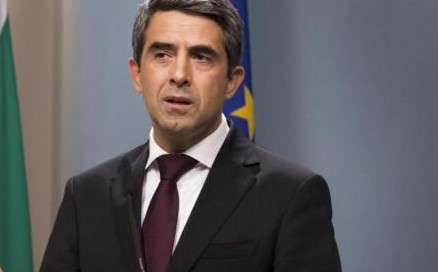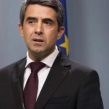
Bulgarian President: Kremlin Wants to Destabilize the Balkans
Publication: Eurasia Daily Monitor Volume: 11 Issue: 92
By:

During his official visit to Germany, Bulgarian President Rosen Plevneliev warned that the Kremlin’s aggression is not limited to Ukraine or the territory of the former Soviet Union, but also threatens Southeastern Europe. “Today we see an aggressive and nationalistic Russia, which pursues a policy of restoring its influence,” remarked Plevneliev at a press conference in Berlin on May 9, adding that Russia was “creeping toward the Balkans” (Deutsche Welle, DPA, BTA Online, novinite.com, May 9).
Plevneliev stressed that Southeastern Europe is the “the weakest link in the European Union” and that this region can be destabilized from the inside using “nationalists, oligarchs, corruption, propaganda and energy dependence.” According to the Bulgarian president, the Kremlin employs oligarchs and their media, capitalizes on the lack of rule of law, and uses channels of influence from communist times. “It is true that the communist secret services were closed down, but their agents and networks continue to exist,” the Bulgarian president said during a lecture in Stuttgart on May 9, the Day of Europe (president.bg/speeches-and-statements, May 10).
Affirming the right of the Ukrainian people to determine their future, he urged the Kremlin to cease its subversive activities and support free elections in Ukraine. Plevneliev stated that Bulgaria is ready to support further sanctions against Russia, despite its heavy dependence on Russian energy supplies.
Following the visit, Spiegel Online wrote that concerns are growing within the German government that the EU’s most impoverished member state could fall into the grips of Moscow’s influence. Citing internal reports, including those of the German foreign intelligence service, the BND, Spiegel warned that: “Moscow may seek to expand its relations with the country in order to use Bulgaria as a political beachhead into the EU, and then use that power to divide the block” (Spiegel Online, May 12).
The Bulgarian president has been a leading voice of his country’s pro-European segment, which denounces the Russian aggression in Ukraine and sees Crimea’s annexation as a threat to European security. However, he is often at odds with the government in Sofia, which is dominated by the Socialist party with strong political and business connections to Moscow. The ruling coalition “includes an illustrious group of former Communist Party members, intelligence service workers, and Bulgarian oligarchs who do business with Russian President Vladimir Putin’s minions,” Spiegel concluded.
The Bulgarian public is also divided about the Ukrainian crisis, with 53 percent opposing the sanctions against Russia and 34 percent approving the annexation of Crimea (Standartnews.com, May 8).
A day before Plevneliev’s speech in Germany, the Bulgarian Socialists and ultra-nationalists in the parliamentary commission on foreign policy adopted a statement that denounced further sanctions against Russia. Socialist parliamentarian Yanaki Stoilov stressed that the statement, which is not legally binding, aims to prevent sanctions that would impact the Russian-led South Stream natural gas pipeline project that Sofia considers strategically important for the country. Bulgaria is almost entirely dependent on Russian energy and suffered hardship when Russia stopped gas deliveries via Ukraine in 2009.
But the opposition party Citizens for the European Development of Bulgaria (GERB) refused to take part in the vote, while the junior coalition partner—the Movement for Rights and Freedoms (MRF), representing the ethic-Turkish minority in Bulgaria—walked out, calling the document legal nonsense and surprising its coalition partner. “We are not against Russia, but defending Russia does not mean opposing the EU,” pointed out Yanko Yankov from MRF, articulating significant differences between the Socialists and the Turks (dnes.dir.bg, May 8).
Although the Turkish party has been loyal to the Socialists in two different governments and has spawned its own oligarchs, now it appears set against any Bulgarian decisions that would contradict EU policy. The reason is logical: the Turkish minority’s bitter experience under Communism, when it was forcibly assimilated, is a testimony to the fact that its rights can only be protected within the EU—especially when the ultra-nationalist Ataka (“Attack”) party has become a vocal supporter of Vladimir Putin. Ataka’s leader, Volen Siderov, even opened his election campaign for the European Parliament in Moscow in April. He declared that “the EU is a puppet of the US and Bulgaria should leave NATO and restore its valuable relations with brotherly Russia” (Mediapool.bg, April 25). But Ataka is losing public support and may not send a single representative to the European Parliament on May 25, when the EU elections will be held (Standartnews.com, May 8).
Bulgaria’s energy dependence on Russia has also translated into political interference by Moscow, which is becoming a major reason of concern in the EU. The Bulgarian opposition Reformist Bloc recently uncovered that Gazprom has orchestrated the controversial changes to the Bulgarian Energy Act, which passed on a first reading in April. The amendments aimed to circumvent European energy regulations and were met with harsh criticism by the EU Energy Commission (novinite.com, May 8; see EDM, April 7).
When speaking with Bulgaria’s President Plevneliev, German Foreign Minister Frank-Walter Steinmeier raised the question about the Bulgarian government’s planned law to exclude the South Stream gas pipeline project from the EU’s Third Liberalization Package. Plevneliev told journalists in Berlin: “The?matter is watched very closely by the German government and we ?ought to expect that we will only be judged on our own merit, on the grounds of what kind of law is passed in the Bulgarian parliament, whether it is aligned with EU legislation or whether ?it aims to [circumvent] EU regulations. This will certainly have a very strong effect and a very strong impact, and we need to be aware of that. The signal sent out by the German Foreign ?Ministry was very clear” (BTA Online, May 9).
In an interview for bTV on May 12, Plevneliev said that he would not allow a situation where European legislation is disregarded by Bulgaria, which is a member of the EU. “Nor can I allow parts of Bulgaria’s territory to be excluded from the territory of the European Union,” as the amendments stipulate, he added.
The Bulgarian president appears determined to fight a one-man war against corrupt Bulgarian politicians, the Russian energy mafia, as well as the Kremlin’s plans to destabilize the Balkans and divide the EU. But the cohort of Moscow’s supporters was quick to launch a parliamentary probe into his activities, in a clear attempt to counter his candid remarks in Germany. The opposition claims the inquiry is unconstitutional (Sega, May 9; BTA, May 14).




